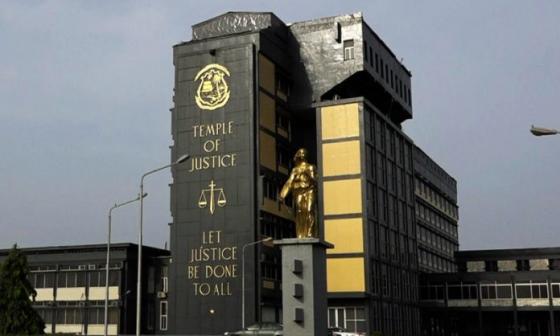Liberia: Supreme Court to Review Judge Carey's Ruling in US$5M Case

Supreme Court of Liberia.
The Supreme Court may shortly begin hearing arguments as to whether or not Judge Ciapha Carey relied on the rightful law to accept a request not to be jointly tried with the other defendants, filed by one of the co-defendants, the Ecobank Liberia Limited, in the US$5 million theft case.
Judge Carey’s ruling on March 29, was met with strong resistance by the prosecutors, who had earlier advised the judge not to do so,because it would collapse the entire case.
In his ruling, which is being protested by the government lawyers, Judge Carey explained that the bank is a legally registered financial institution in the Republic of Liberia, that has operated for more than fifteen (15) uninterrupted years.
Besides, Judge Carey ruled that the bank is regulated by the Central Bank of Liberia (CBL).
“The indictment jointly charged the bank and other defendants for theft of property, forgery and criminal conspiracy,” Judge Carey ruled, “In the mind of this court, the bank’s argument that its defenses and interests are different from the other defendants is correct.”
Carey continued, the primary purpose of criminal prosecution in our jurisdiction is to seek justice for both the State, as well as the criminal defendant, and not to just convict in the face of prejudice.
“In the instance it appears that the defenses and interests are aggressive to each other, and as such, a separate and severance trial is the appropriate means to render justice and fair trial.”
Therefore, Judge Carey said, “Ecobank’s motion for severance and separate trial is hereby granted, and the resistance, thereto denied and dismissed. Co-defendant Ecobank is hereby ordered tried separately in these proceedings.”
Despite the prosecutor’s plea, Judge Carey proceeded to deny their argument, causing the government lawyers to appeal before the Supreme Court.
The controversial judgment, if accepted by the Supreme Court, means that both the Criminal Court ‘C’, and the Supreme Court may set a pattern for more defendants, including the Afriland First Bank, to follow.
The bank’s request was triggered by the government's indictment, wherein the prosecutors claimed that, the bank colluded with several other co-defendants, to include the Secretary of the Liberian Senate, Nanborlor Singbeh, and the Afriland First Bank, to dupe two Czech Republic investors, Martin Miloschewsky and Pavel Miloschewsky, in the amount of US$ 5 million, in both cash and mining equipment.
The prosecutors claimed that the management of Ecobank and Singbeh, then the president and chief executive officer (CEO), MHM Eko Liberia, operated a fraudulent account, in the name of the company, and there, they made the Miloschewsky brothers to wire and transfer US$2.5 million, there for the purposes of engaging into crushed rock production.
Singbeh, according to the prosecutors, used a similar method to connive with another bank, Afriland First Bank, where the Czech investors wired and transferred the amount of US$102,000.
Prosecutors are claiming that the two banking institutions directly benefited from the monies the Czech investors transferred to the country for investment purposes, which the company only existed on documents, and did not produce a single rock, despite the transfer of the monies, which the prosecutors was opting for the denial of the motion for severance and separate trial.
At one point, the indictment claimed that one of the two Czech Republic nationals, Alex Sramek, whose photo and signature specimen appeared on the document that led to the opening of the fraudulent account, had never been in the country.
Moreover, Karel Socher, then general manager of the MHM Eko, also a Czech Republic national did not have a residency permit, to allow him to open the account where the Czech investors transferred the monies.
According to the indictment, Ecobank and Afriland First Bank jointly facilitated the commission of the crimes, as determined from the Liberia Immigration Service (LIS) records.
Yet, Judge Carey’s ruling justified that Ecobank deserved the separate trial, because it has operated as a financial institution in Liberia for more than 15 uninterrupted years.
